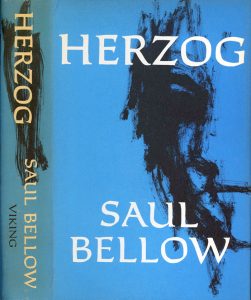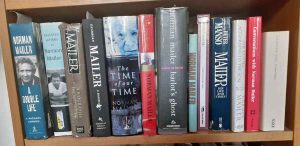Schloime, Meet Nachum; Saul, Meet Norman
by Robert Liebman
(Posted 23 February 2024)
The famous Bermuda Triangle swallows ships—supposedly.
The less well known Belarus-Latvia-Lithuania Triangle produces great Jewish-American writers—for real.
Avraham Belo was born in Druya, in Belarus on the border with Latvia. He married Lescha Gordon, a rabbi’s daughter, from Dagda, in Latvia. At the time (late nineteenth century) this entire region, the Pale of Settlement, was part of Czarist Russia.
Avraham and Lescha had three children before emigrating to Montreal, Canada, and after their fourth child, Shloime. arrived, they moved again, to Chicago.
 Shloime became Saul, Belo became Bellow, a financially-strapped professor and writer (1915-2005) who was considered a failure in a family of successful businessmen. He redeemed himself, but only partially, when he was awarded the Nobel Prize for Literature in 1976.
Shloime became Saul, Belo became Bellow, a financially-strapped professor and writer (1915-2005) who was considered a failure in a family of successful businessmen. He redeemed himself, but only partially, when he was awarded the Nobel Prize for Literature in 1976.
Isaac Barnett Mailer and Fanny Schneider—from Panevezys, Anyksciai and Utena in Lithuania—met and married in New Jersey, where their son Nachum Melech—aka Norman Kingsley (1923-2007)—was born.
 His debut novel, Nor, after his stunning debut with his war novel The Naked and the Dead (1948), made a splash and he followed it, over a long and boisterous career, with nine more novels. None amounted to much. But he excelled as a journalist and outdid Bellow in marriages, racking up six to Bellow’s mere five. He wanted a Nobel—oh, did he want a Nobel—but it wasn’t to be for this head-butting wife-stabbing if prolific writer.
His debut novel, Nor, after his stunning debut with his war novel The Naked and the Dead (1948), made a splash and he followed it, over a long and boisterous career, with nine more novels. None amounted to much. But he excelled as a journalist and outdid Bellow in marriages, racking up six to Bellow’s mere five. He wanted a Nobel—oh, did he want a Nobel—but it wasn’t to be for this head-butting wife-stabbing if prolific writer.
Both Bellow and Mailer, each the grandson of a rabbi, were religious as children but, as adults, only Bellow mined his religion and his east European heritage for material.
All-American Made-in-Canada Boy
In Dangling Man (1944), Bellow’s hero dangles as he waits to be drafted into the army, and in his second novel, The Victim (1947), two men engage in an anti-semitic tussle. Although competently written, neither book made a significant impact. With The Adventures of Augie March (1953), he electrified the literary world.
Augie flits from job to job, from girl to girl, from place to place: in Chicago and other American locations and then Mexico, Paris, Rome, and the ocean between the two continents.
In the novel’s very first sentence, Bellow specifies that his hero is Chicago-born. It is soon obvious, though, that Augie and his circle of relatives and friends are Jewish. A few have even come off the boat so recently that their English contains plenty traces Yiddish.
In the novel, Augie’s cousins speak to their children in Russian or Yiddish, and the children reply in English, a reflection of the author’s own multi-lingual (French and English as well as Russian and Yiddish) household. Augie and “Grandma” Lausch speak to one another in Yiddish.
Bellow’s best known character is the eponymous hero of Herzog (1964), who is at once less and more Jewish than Augie. Going through a painful divorce after being cuckolded by his best friend, Herzog writes letters to the dead as well as the living, doesn’t post them, and wonders if he is crazy.
The east European tints of Augie March have largely vanished, but Herzog is Jewish to the core in its moral and emotional sensibility as the hero unravels and then pulls himself together.
The protagonist of Mr Sammler’s Planet (1970) is a Polish-born Holocaust survivor dismayed by modern American culture. Strongly and convincingly Jewish too are short stories such as “The Old System” and “A Silver Dish.”
Not-so-Nice Jewish Boy
Mailer excelled public school and attended cheder every afternoon, but at his bar mitzvah he invoked Spinoza and Marx more than Moses, signalling at this tender age the secular rebellious direction he would follow for the rest of his often turbulent life.
Although he detested the image of the nice Jewish boy, Mailer created several characters, alter egos of himself, who are part Jewish (and, usually, part Irish). His war novel contains two Jewish soldiers when, for ethnic balance and historical accuracy, one would have sufficed. They are minor characters. He heart was not into nice Jewish boys.
On separate occasions he considered writing about his Russian ancestors but both attempts quickly fizzled out. He lacked enough information about his forebears, he believed. More likely, he was motivated more by desperation (he was determined to write a trilogy) than inspiration. In the latter part of his career, he’d actually entertained visions of two separate trilogies, but of six potential novels he managed to publish only one: his very long and very tedious Ancient Evenings (1983), set in pre-Judeo-Christian Egypt.
Having amassed a total of nine children and half a dozen wives, Mailer had many mouths to feed, and lawyers to pay. Many of Mailer’s books, nonfiction as well as fiction, were written primarily to satisfy his check book.
Bellow and Mailer were part of an extraordinary generation of Jewish-American writers that included, among many others, Philip Roth (1933-2018), whose marvellous oeuvre includes Portnoy’s Complaint and American Pastoral, and the estimable Bernard Malamud (1914-1986), author of The Fixer, The Assistant and numerous exceptional short stories. Their grandparents hailed from present-day Ukraine, in the Lviv-Kiev-Kamenets/Podolsky Triangle. ###
